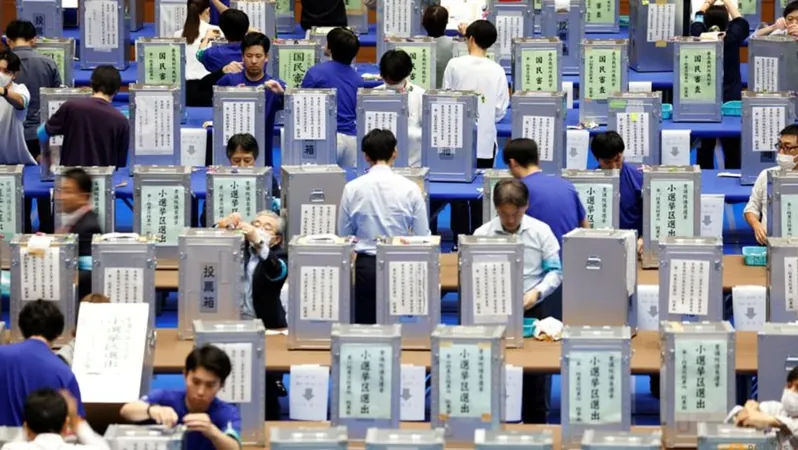
Major Political Shift in Japan: Voters Reject PM Ishiba Amid Scandals and Economic Struggles
2024-10-27
Author: Wei Ling
Major Political Shift in Japan: Voters Reject PM Ishiba Amid Scandals and Economic Struggles
TOKYO: In a significant twist to Japan’s political landscape, exit polls for the general election held on October 27 indicate that Prime Minister Shigeru Ishiba's ruling coalition is poised to lose its parliamentary majority, injecting uncertainty into the governance of the world's fourth-largest economy.
According to a Nippon TV poll, the Liberal Democratic Party (LDP), which has dominated Japanese politics for nearly all of the post-war era, along with its junior coalition partner Komeito, is projected to secure only 198 of the 465 seats in the lower house. This marks a drastic decline from the needed 233 seats to maintain a majority, likely resulting in the party's worst election performance since its brief loss of power in 2009.
The biggest beneficiary of this election cycle appears to be the main opposition group, the Constitutional Democratic Party of Japan (CDPJ), anticipated to capture around 157 seats. This voter backlash reflects widespread frustration with Ishiba’s administration, largely fueled by a recent funding scandal and rising inflation that has strained household budgets across the nation.
With economic pressures mounting and East Asia’s geopolitical landscape becoming increasingly volatile, the potential loss of a parliamentary majority raises questions about the future stability of Ishiba’s administration. This election comes on the heels of an equally uncertain political climate in the United States, Japan's closest ally, as American voters prepare for their own ballots in just a few days.
Acknowledging the gravity of the situation, Ishiba appeared somber during an interview with TV Tokyo, stating, “This election has been very tough for us,” as about 40% of seats remained undecided. He has pledged to await final results—expected in the early hours of Monday—before deliberating any coalition partnerships.
Polling data from public broadcaster NHK suggested a wider range of possible outcomes, predicting the LDP could win between 174 to 254 seats, while the CDPJ may secure between 128 to 191 seats. Ishiba had called for this snap election shortly after assuming leadership of the party, hoping to secure a public mandate following the resignation of his predecessor, Fumio Kishida, who faced backlash over inflation and unreported donations to lawmakers.
Since regaining power in 2012 after a brief opposition period, the LDP has maintained an outright majority. However, the last time the coalition lost power was in 1993 when a diverse opposition coalition took over for less than a year.
Market analysts predict immediate repercussions for Japanese financial markets, with declining stock values and rising bond yields likely as investors grapple with the uncertain political future. “The voters’ judgement on the ruling bloc was harsher than expected,” commented Saisuke Sakai, senior economist at Mizuho Research and Technologies. “The uncertainty surrounding the administration's continuity has increased, and the stock market is likely to react negatively, particularly from foreign investors.”
Political Realignment on the Horizon
The exit polls also hint at a pivotal role for smaller parties like the Democratic Party for the People (DPP) and the Japan Innovation Party in any potential government formation. The DPP is projected to secure between 20 to 33 seats, while the Japan Innovation Party may obtain between 28 to 45. However, their differing policy positions present challenges for coalition-building.
DPP chief Yuichiro Tamaki has left the door open for discussions with the LDP-led coalition, while Japan Innovation Party leader Nobuyuki Baba has outright rejected any partnership. The DPP aims to halve Japan's 10% sales tax until real wages stabilize, a proposal not aligned with LDP policies. Simultaneously, the Innovation Party insists on stricter donation regulations to combat political corruption.
As political negotiations unfold, experts warn of potential market instability. “With a more fluid political landscape, advancing economic policies like tax increases to fund defense spending will be significantly more challenging,” noted Masafumi Fujihara, associate professor of politics at Yamanashi University. “The absence of a robust government may hinder the Bank of Japan’s efforts to manage interest rates and control the weakening yen.”
The upcoming days are crucial as Japan navigates the potential for a coalition government amidst pressing economic challenges and fluctuations in public trust. Political observers will be closely monitoring the outcomes as implications for both domestic policies and international relations unfold. Stay tuned for updates on this evolving situation!





 Brasil (PT)
Brasil (PT)
 Canada (EN)
Canada (EN)
 Chile (ES)
Chile (ES)
 España (ES)
España (ES)
 France (FR)
France (FR)
 Hong Kong (EN)
Hong Kong (EN)
 Italia (IT)
Italia (IT)
 日本 (JA)
日本 (JA)
 Magyarország (HU)
Magyarország (HU)
 Norge (NO)
Norge (NO)
 Polska (PL)
Polska (PL)
 Schweiz (DE)
Schweiz (DE)
 Singapore (EN)
Singapore (EN)
 Sverige (SV)
Sverige (SV)
 Suomi (FI)
Suomi (FI)
 Türkiye (TR)
Türkiye (TR)